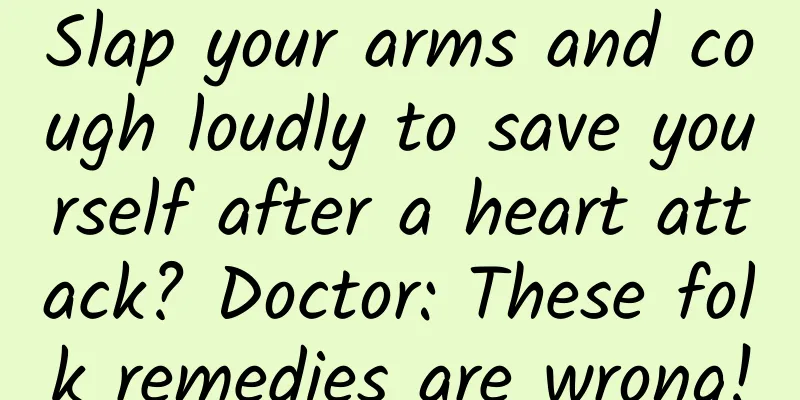Slap your arms and cough loudly to save yourself after a heart attack? Doctor: These folk remedies are wrong!

|
After the emergency consultation, I picked up my stethoscope and prepared to go back to the ward. There was another noise in the emergency hall. A middle-aged man was carrying a man in his 60s on his back. The woman behind him was running and shouting, "Doctor, save him." After transferring the patient to the emergency room, we found that the patient had no breathing and heartbeat, so we quickly intubated and performed chest compressions. During the intubation, we found that there were a lot of food residues in the patient's mouth and his vision was blurred. After clearing the foreign objects in the mouth, the intubation was successfully completed. The woman next to him cried and described the result of the incident: "My husband has a bad heart and narrow blood vessels. The doctor said he has the risk of myocardial infarction. He felt uncomfortable in the morning when he woke up, and it got worse at noon. So I patted his arms and asked him to cough hard like what was said on the Internet, but the symptoms did not ease. So I asked him to drink water to dilute the blood, but he choked after a few sips, and then he couldn't be woken up. Then we carried him to the hospital. You must save him, doctor!" I was standing by and took a deep breath after hearing what the aunt said. I clapped my arms, coughed hard, moved to my feet, and drank water. This was simply a complete collection of wrong self-help for myocardial infarction! Although doctors and nurses took turns to rescue the patient, they were ultimately unable to bring the patient back from the brink of death. These self-help remedies for heart attack are all wrong. The so-called myocardial infarction refers to the blockage of the main trunk or branches of the important coronary arteries of the heart, causing myocardial ischemia and hypoxia, and thus myocardial necrosis. As the incidence of myocardial infarction increases year by year, the mortality rate is extremely high if the disease is not treated in time. Therefore, self-help remedies for myocardial infarction can be seen everywhere on the Internet. However, incorrect self-help methods are not only useless but also delay the disease. The family of the patient in the above article saw that the incorrect self-help methods aggravated the disease and lost the best time for treatment. When it comes to self-help remedies for heart attack, the more common ones are clapping your arms, coughing hard, and getting up to drink water. Some people believe that patting the arms can disperse the blood clots in the arms and thus relieve myocardial infarction. First of all, if patting can really disperse the blood clots, then no one would intervene with thrombolysis and clot aspiration. Secondly, myocardial infarction causes myocardial hypoxia and ischemia, which has nothing to do with the arms. Those who think that coughing hard can promote blood circulation and relieve myocardial ischemia are also wishful thinking. In fact, coughing hard will only increase oxygen consumption, increase the burden on the myocardium, and thus aggravate the condition. Standing up to drink water is the most harmful to patients with myocardial infarction. Standing up will increase oxygen consumption and increase the burden on the heart. Drinking water can also easily cause aspiration. The foreign body in the patient's mouth in the article is considered to be caused by vomiting in the digestive tract. Once inhaled into the respiratory tract, it will cause hypoxia and suffocation. How to save yourself in case of myocardial infarction? 1. Lie flat on the ground, keep quiet, and call 120. Once a heart attack is suspected, you should lie down flat on the spot. Any ineffective activity will increase myocardial oxygen consumption and thus aggravate the condition. The correct choice is to lie down flat on the spot, call 120 and wait for 120 rescue. 2. It is important to use vasodilator drugs While waiting for the emergency number 120, if you have a blood pressure monitor at home and are sure your blood pressure is not low, you can take nitroglycerin sublingually. 3. CPR can save lives If cardiac arrest occurs, perform cardiopulmonary resuscitation immediately until the arrival of 120. How to prevent myocardial infarction 1. Regular diet is important Eat a balanced diet, eat more vegetables and less meat, eat less high-calorie and high-fat foods, and eat more fruits and vegetables. 2. Develop good living habits Go to bed early and get up early, and don't stay up late. Staying up late will increase vascular endothelial damage, thereby increasing the incidence of thrombosis. 3. Avoid overexertion Myocardial oxygen consumption increases when fatigued, and if there is a potential risk, it may induce a myocardial infarction. Summary: Myocardial infarction is a disease with a high mortality rate. Correct self-help can save a life. Please forward this information to people around you. |
>>: Doctor: Is pink eye, which can be transmitted by just looking at it, really that scary?
Recommend
What happens if there is a small amount of bleeding after an abortion?
With the openness of sexual concepts nowadays, ma...
Hand-eye coordination training for children with cerebral palsy
Hand-eye coordination training for children with ...
Can I detect pregnancy if my period is delayed for four days?
Female friends all know that the menstrual period...
Can pregnant women use lipstick?
Lipstick is a common cosmetic among women, but th...
Light bleeding one year after menopause
A small amount of bleeding one year after menopau...
If your hands turn purple when exposed to cold, don't be careless, it may be a rheumatic disease
Author: Zhao Xiaozhen Beijing Children's Hosp...
What to do if pregnant women have stomach pain in late pregnancy
Pregnant women are a group that we need to pay at...
Can I use hyaluronic acid during pregnancy?
Hyaluronic acid is divided into two types: inject...
How to prevent stretch marks from spreading
In the last month, the fetus grows and develops r...
There is a small fleshy growth on the female anus
Creating life is a difficult process. Even after ...
There is a difference between cervical erosion and cervical hypertrophy, women must know!
Cervical erosion and cervical hypertrophy both fa...
Is it good to buy Gannan navel oranges online? What are the disadvantages of buying Gannan navel oranges online?
We all know that oranges are rich in vitamins, mi...
How to correct a girl's hunchback
Children are most likely to develop hunchbacks wh...
Pictures of women with back pain
Low back pain may be a condition that most people...
Will I get pregnant if I have sex 3 days after my period ends?
We all know that you cannot have sex during your ...









